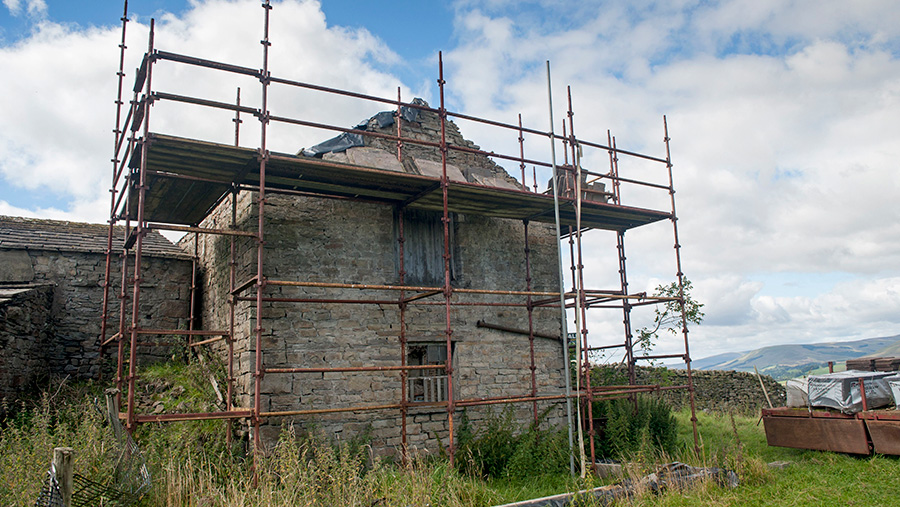Business Clinic: Tax advice for holiday let barn conversion
 © FLPA/Wayne Hutchinson/REX/Shutterstock
© FLPA/Wayne Hutchinson/REX/Shutterstock Whether you have a legal, tax, insurance, management or land issue, Farmers Weekly’s Business Clinic experts can help.
In this article, Lisa Oliver of Hazlewoods offers tax advice on how to structure a family farm diversification involving the next generation.
Q: We run a 121ha sheep and arable business as a husband and wife partnership.
There is a barn on the farm that now has planning permission to be converted to a furnished holiday let (FHL), although the planning permission does stipulate this can only be used as a FHL.
Our daughter runs a holiday let tipi enterprise (not VAT registered) on the farm but separate from the farm business.
In the short term we would like to rent the barn to our daughter so she can run the FHL in her sole trade business and the future plan would be to gift the barn to her.
What tax and VAT implications should we consider?
A: If the barn conversion was to be undertaken within the farm partnership all input VAT would be recoverable, which would be at a reduced rate (5%) if using an external contractor.
 Lisa Oliver
Lisa OliverSenior manager, Hazlewoods
See also: Tax implications of building farmyard housing
The conversion costs will be capital expenditure and unfortunately will not qualify for income tax relief, although capital allowances may be available on any integral features, for example, electrical systems.
As the planning stipulates that the barn conversion can only be used as a furnished holiday let, the partnership would have to charge output VAT on the rental charged to your daughter, and this would be a cost to her as she would be unable to recover the VAT.
Your daughter would not have to charge output VAT on the FHL lettings if she is not VAT registered and does not breach the annual VAT turnover threshold of £83,000 with the additional FHL income.
As long as the partnership is still predominantly a trading business, and the barn is a partnership asset, the property should qualify for business property relief (BPR) under the current rules and would not be subject to inheritance tax (IHT) if left to your daughter on death.
If the barn is left to your daughter in your wills, your daughter would have a base cost equivalent to the probate value, and therefore any gain on a future sale would be reduced.
The cost associated with this way forward is the output VAT charged on the rental to your daughter.
Lifetime gift
An alternative approach would be to make a gift of the barn during your lifetime – this would be a potentially exempt transfer in terms of IHT for yourselves, and provided you survive seven years, this would fall out of your estate completely.
If you were to die within seven years, the value clawed back into your estate would be the value of the barn at the date that it was given away.
The barn may no longer qualify for BPR in your daughter’s hands at the date of your death, and so the value at the date of the gift would fall within your estate with no relief.
If you are considering a lifetime gift, ideally this should be while the barn is still in agricultural use, as this should ensure no capital gains tax (CGT) arises on the gift.
While the barn is still used in the agricultural business, the gain on the transfer to your daughter can be held over, and therefore she would take on your base cost.
The consequence of this is that if the barn is sold in the future, this could trigger significant CGT liabilities.
The downside of gifting the unconverted barn is that the input VAT would not be recoverable on the conversion costs as these would now be incurred by a non-VAT registered person.
Conversely, making any repairs to the existing structure, while it is used in the farming business, would allow the cost to be claimed as an income tax deduction in the farm accounts and all input VAT would be recoverable.
Gifting the property during your lifetime may impact on who pays for the conversion.
If gifted there will be no stamp duty land tax (SDLT) payable, although if borrowings associated with the barn are also transferred there will be SDLT costs, as the borrowings will be deemed to be proceeds of the transfer.
Do you have a question for the panel?

Outline your legal, tax, finance, insurance or farm management question in no more than 350 words and Farmers Weekly will put it to a member of the panel. Please give as much information as possible.
Send your enquiry to Business Clinic, Farmers Weekly, RBI, Quadrant House, The Quadrant, Sutton, Surrey SM2 5AS.
You can also email your question to fwbusinessclinic@rbi.co.uk.
